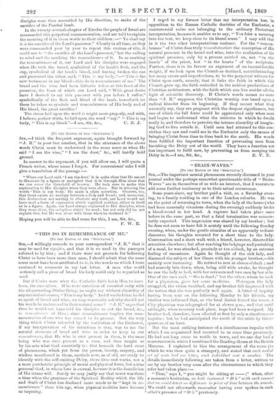"THIS DO IN REMEMBRANCE OF ME."
[TO THE EDITOR OF THE "SPECTATOR."]
SIR,—I willingly concede to your correspondent "J. R." that is may be used for signifies, and that it is so used in the passages referred to by him ; and if there were not grounds for believing Christ to have been more than man, I should admit that the same sense must have been attributed to is, in the words on which I have ventured to comment in my last letter. A man who could seriously call a piece of bread his body could only be regarded as mad.
But if Christ were what the Catholic faith holds Hint to have been, the case alters. If he were conscious of essential unity with the all-pervading Divine Being, he might say without absurdity of any natural substance, ‘"1.'llis is my body." And if we find that lie did so speak of bread and wine, we may reasonably ask why should not his words be understood in their natural sense? " J. It." urges that then he would not have told his disciples to eat the bread, &c., in remembrance of Him ; since remembrance implies the commemoration of one who has ceased to be present. But the very thing which Christ intended by the institution of the Eucharist, if my interpretation of his intentions is true, was to use the natural elements of bread and wine in order to keep in our remembrance, that lie who is ever present in them, is the same beiug who was once present as a man, and then taught us by his acts what God essentially is ; that beneath the hard crust of phenomena, which yet from the power, beauty, majesty, and wisdom manifested in them, myriads now, as of old, are ready to identify with the self-existing Deity, there lives and works, not a a mere pantheistic principle of moral and physical force, but a true personal God, in whom love is eternal, because it is the foundation of His triune will. Surely we may justly say that never was there a time when the greatness of the Spiritual Reality which the life and death of Christ has disclosed more needs to be "kept in remembrance" than this age, when physical realities have become so imposing. I urged in my former letter that my interpretation has, in opposition to the Roman Catholic doctrine of the Eucharist, a controversial value not belonging to the ordinary Protestant interpretation, because it enables us to say, " you foist a meaning into the text, we keep close to its literal sense." I may add that in it the two other interpretations coalesce. For the " remembrance " of Christ does truly transubstantiate the conception of His natural presence in the bread and wine, into the realization of his spiritual presence, only by a process carried on, not "in the hands" of the priest, but " in the hearts " of the recipients. Further, there is in its favour an argument of no inconsiderable weight, if we look upon the Church as destined, notwithstanding her many errors and imperfections, to be the perpetual witness for Christ upon earth, namely, that it links the faith in which this Church grew up, the faith embodied in the noblest productions of Christian architecture, with the faith which can live amidst all the light of scientific discovery. If Christ's words meant no more than "J. R." supposes, the Christian worship was based upon a radical blunder from its beginning. If they meant what they naturally say, they are pregnant with the deepest significance, but one of which the full force could be appreciated only when man had begun to understand what the universe in which he dwells really is, and therefore to perceive the intense absurdity of imagining God to live outside it. Until men had attained to this conviction they saw and could see in the Eucharist only the means of bringing Christ from time to time back to the earth. His words then fulfilled the important function of preventing men from banishing the Deity out of the world. They have a function not less important to fulfil now, by preventing us from merging the
Deity in it.—I am, Sir, &c., E. V. N.


































 Previous page
Previous page